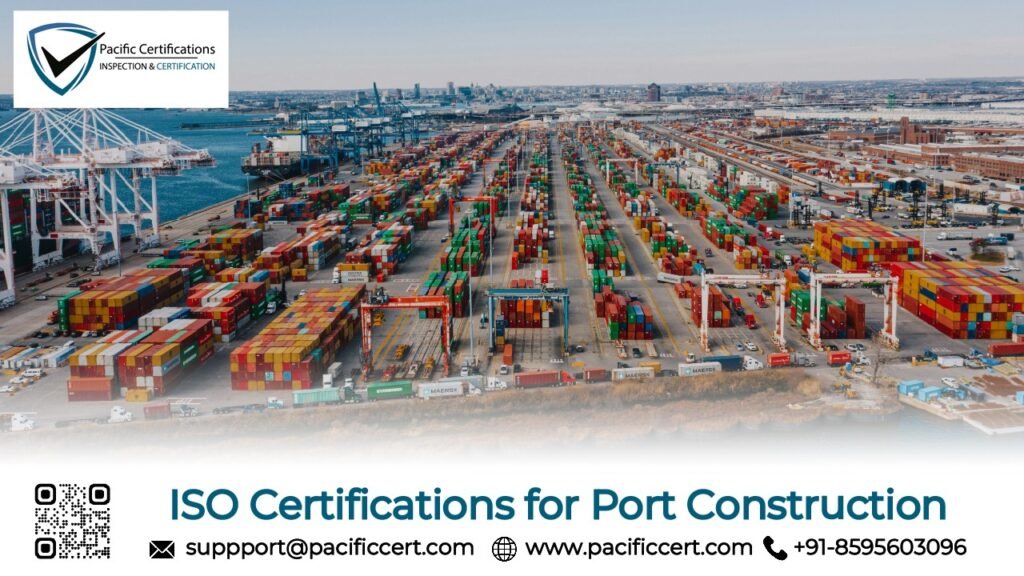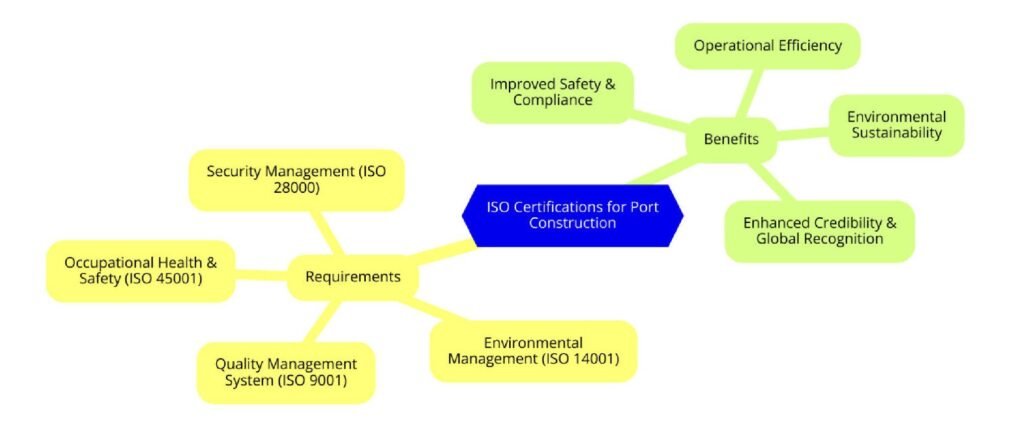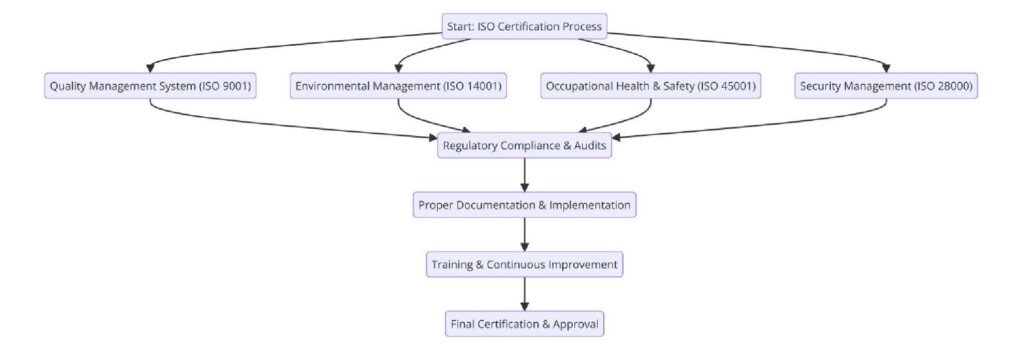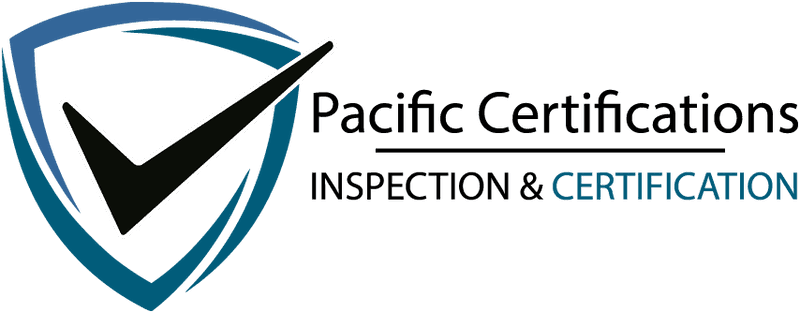
ISO Certifications for Port Construction Businesses, Requirements and Benefits
Port construction is a complex and high-stakes industry that demands precision and compliance with global safety and environmental standards. With growing international trade and the need for sustainable infrastructure, port construction projects must implement strict regulations. ISO certifications play a crucial role in ensuring that these projects meet global benchmarks for quality, safety & efficiency.
ISO standards provide a structured framework for managing risks and ensuring regulatory compliance in port construction. Whether it’s quality management, environmental responsibility, occupational health and safety or security, ISO certifications help port developers and operators maintain best practices while ensuring sustainable growth.

Schedule an audit with our team by emailing support@pacificcert.com to begin your ISO certification process.
Applicable ISO Standards for Port Construction
Several ISO standards apply to port construction projects. These standards help ensure that ports are built and operated efficiently, sustainably, and safely. Below are the most relevant ISO certifications for port construction:
ISO 9001:2015 – Quality Management System (QMS): ISO 9001:2015 is essential for maintaining quality in port construction. It provides a framework for consistent project execution, ensuring that construction processes meet regulatory requirements and stakeholder expectations. This certification helps companies streamline operations, reduce defects, and enhance overall project efficiency.
ISO 14001:2015 – Environmental Management System (EMS): Given the environmental impact of port construction, ISO 14001 is crucial for minimizing negative effects on marine ecosystems. This standard ensures that companies implement sustainable practices, manage waste efficiently, and comply with environmental regulations.
ISO 45001:2018 – Occupational Health and Safety Management System (OHSMS): Safety is a major concern in port construction due to the high-risk activities involved. ISO 45001 helps construction firms create a safer workplace by identifying hazards, mitigating risks, and ensuring compliance with occupational health and safety regulations.
ISO 50001:2018 – Energy Management System (EnMS): Ports require vast amounts of energy for construction and operation. ISO 50001 provides a systematic approach to energy efficiency, helping organizations reduce energy consumption, lower costs, and minimize carbon footprints.
ISO 55001:2014 – Asset Management System (AMS): This standard helps port authorities manage infrastructure assets effectively, ensuring long-term sustainability and operational efficiency. It assists in planning, investment decision-making, and risk assessment for port facilities and equipment.
ISO 22301:2019 – Business Continuity Management System (BCMS): Port construction projects are vulnerable to disruptions such as natural disasters, cyber threats, and supply chain issues. ISO 22301 ensures that ports have contingency plans in place to maintain operations during crises.
ISO 31000:2018 – Risk Management Guidelines: Risk management is integral to port construction, covering financial, operational, and environmental risks. ISO 31000 provides a structured approach to risk assessment, helping construction firms minimize uncertainties and make informed decisions.
ISO 28000:2022 – Supply Chain Security Management System: Since ports play a key role in global supply chains, ensuring security is critical. ISO 28000 helps organizations enhance security measures, reduce risks of cargo theft, and comply with international trade regulations.
Click here to find out more applicable standards to your industry
At Pacific Certifications, we specialize in auditing and issuing ISO certifications for port construction projects. Our certification process ensures that your organization complies with international standards.
We conduct thorough audits to assess compliance with ISO requirements and issue certifications upon successful evaluation. By partnering with us, you can demonstrate your commitment to quality, safety & environmental responsibility in port construction.
For more details or to begin your certification journey, reach out to us at support@pacificcert.com.
Requirements of ISO Certifications for Port Construction
Each ISO standard applicable to port construction has specific requirements that organizations must meet. Below is a breakdown of the key requirements for each relevant standard:

ISO 9001:2015 – Quality Management System (QMS)
- Establish a quality management framework
- Define and document processes for quality assurance
- Conduct regular internal audits and performance evaluations
- Ensure customer satisfaction and continuous improvement
ISO 14001:2015 – Environmental Management System (EMS)
- Identify and assess environmental impacts of construction activities
- Develop environmental objectives and monitoring programs
- Implement waste management and pollution control measures
- Ensure compliance with environmental laws and regulations
ISO 45001:2018 – Occupational Health and Safety Management System (OHSMS)
- Conduct risk assessments for workplace safety hazards
- Implement safety policies and emergency response plans
- Provide training on occupational health and safety
- Maintain records of incidents and corrective actions
ISO 50001:2018 – Energy Management System (EnMS)
- Develop an energy policy and efficiency improvement plan
- Monitor energy consumption and identify savings opportunities
- Implement energy-efficient technologies and practices
- Ensure compliance with energy regulations
ISO 55001:2014 – Asset Management System (AMS)
- Establish a structured approach to managing port infrastructure assets
- Define asset lifecycle planning and risk assessment procedures
- Ensure cost-effective asset utilization and maintenance
- Continuously evaluate and improve asset performance
ISO 22301:2019 – Business Continuity Management System (BCMS)
- Identify critical operations and potential threats
- Develop a business continuity plan for emergency situations
- Establish response and recovery strategies
- Conduct periodic testing and reviews of the continuity plan
ISO 31000:2018 – Risk Management Guidelines
- Identify and analyze risks related to port construction
- Develop risk mitigation and response strategies
- Integrate risk management into decision-making processes
- Regularly review and update risk management frameworks
ISO 28000:2022 – Supply Chain Security Management System
- Assess security risks in the port supply chain
- Implement measures to prevent cargo theft and security breaches
- Develop a security management plan with response protocols
- Ensure compliance with international trade security regulations
For ISO certification services, contact Pacific Certifications at support@pacificcert.com.
Benefits of ISO Certifications for Port Construction
ISO certifications offer numerous advantages for port construction projects:

Project Quality: ISO 9001 ensures that port construction follows standardized procedures, reducing errors and improving overall quality.
Sustainability: ISO 14001 helps mitigate environmental impacts, ensuring compliance with ecological regulations and sustainable development goals.
Worker Safety: ISO 45001 minimizes workplace accidents and injuries, fostering a safer construction environment.
Cost Savings: ISO 50001 assists in reducing energy consumption, leading to lower operational costs.
Risk Management: ISO 31000 and ISO 22301 help organizations prepare for disruptions, reducing project delays and financial losses.
Competitive Advantage: ISO-certified ports gain a reputation for reliability, security & sustainability, attracting investors and business partners.
The port construction industry is evolving rapidly this year, with a strong focus on green infrastructure and digital transformation. Governments worldwide are investing in smart ports that leverage AI, automation, and blockchain for improved efficiency.
A key trend is the adoption of sustainable port designs with eco-friendly construction materials, renewable energy sources, and carbon-neutral operations. Regulatory bodies are also tightening environmental and safety standards, making ISO certifications more crucial than ever for compliance and competitiveness.
Obtaining ISO certification is a strategic move for any port construction project. It enhances credibility, ensures compliance, and opens doors to international business opportunities.
If you’re ready to certify your port construction project with globally recognized ISO standards, Pacific Certifications is here to help.
Pacific Certifications is accredited by ABIS, in case you need support with ISO certification for your Port Construction business, please contact us at support@pacificcert.com or +91-8595603096.
FAQs: ISO Certifications for Port Construction
ISO certification ensures quality, safety, environmental sustainability, and regulatory compliance in port construction projects.
The certification timeline depends on the complexity of the project and the organization’s preparedness. On average, it takes a few weeks to a few months.
No, Pacific Certifications specializes in audits and certification issuance, not implementation or training.
While not legally mandatory, ISO 9001, ISO 14001, and ISO 45001 are highly recommended for compliance with industry best practices.
It improves efficiency, reduces risks, ensures compliance, and enhances the reputation of construction firms and port authorities.
Read More at: Blogs by Pacific Certifications






